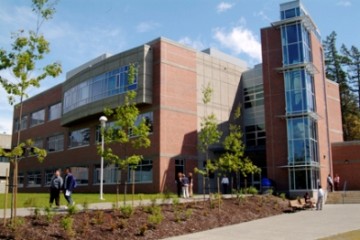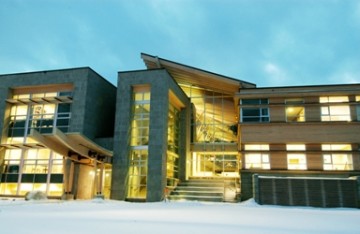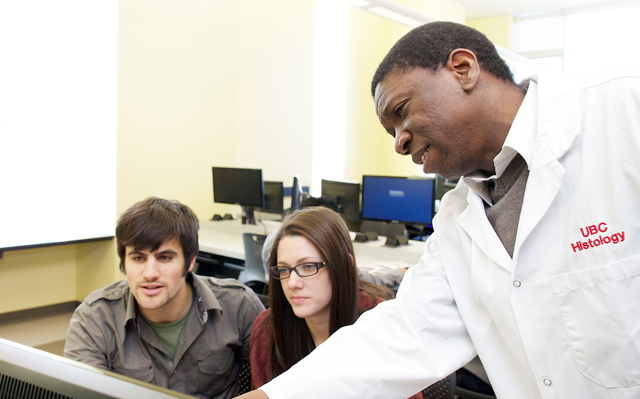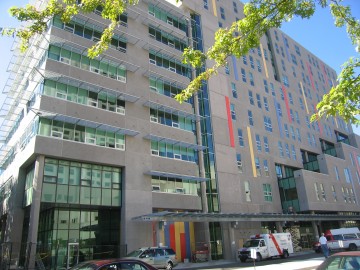The MD Undergraduate Program is comprised of four geographically distinct sites including the Island Medical Program (IMP), Northern Medical Program (NMP), Vancouver Fraser Medical Program (VFMP), and the Southern Medical Program (SMP). There is a total of 328 entry-level positions: 40 for the IMP, NMP and SMP each, and 208 for the VFMP.
Since expansion began in 2004, the UBC Faculty of Medicine, in partnership with the provincial government, the University of Victoria, the University of Northern British Columbia, and all six health authorities, has more than doubled enrolment, and distributed education, clinical training, health sciences research and teaching across B.C. This province-wide approach is made possible through a robust information technology system that allows instructors and students in many disparate locations to interact simultaneously, taking learning beyond classrooms and into clinics and hospitals in urban, rural, remote and Indigenous communities.
The distributed MD Undergraduate Program prepares students to meet the health challenges of tomorrow. Our learners receive the training necessary for a career founded in evidenced-based practice, critical reflection, lifelong learning, and an ability to deliver care in a professional manner. We believe these skills will enable our graduates to transform the communities they serve and improve the health of the BC population and beyond.
Explore our distributed medical program
 The Island Medical Program, based in Victoria, is delivered in collaboration with the University of Victoria. The Medical Sciences Building, located on campus, serves as the home base for the IMP and boasts lecture theatres; anatomy, research and multipurpose laboratories; problem-based learning and clinical skills rooms; and computer labs. IMP students have full access to University of Victoria’s student services, including the library, athletics and recreation facilities, and clubs.
The Island Medical Program, based in Victoria, is delivered in collaboration with the University of Victoria. The Medical Sciences Building, located on campus, serves as the home base for the IMP and boasts lecture theatres; anatomy, research and multipurpose laboratories; problem-based learning and clinical skills rooms; and computer labs. IMP students have full access to University of Victoria’s student services, including the library, athletics and recreation facilities, and clubs.
Students gain clinical experiences across Vancouver Island, including the central island communities of Duncan and Nanaimo as well as north island locations, such as Campbell River, Comox, Port McNeill and Port Hardy.
The medical education experiences reflect the health-related challenges facing mid-sized urban communities, as well as smaller, remote communities which include both a large elderly and Aboriginal population. The IMP blends state-of-the-art medicine, including access to all of the major specialties and most sub-specialties, with community medicine in smaller centres than those found in Vancouver.
To learn more about the program, please visit the IMP website.
 The Northern Medical Program (NMP) is based at the University of Northern BC in Prince George. The Dr. Donald Rix Northern Health Sciences Centre (above), a sophisticated and attractive new building, is home to the program. All NMP students have full access to UNBC’s student services, including the Northern Sport Centre, a state-of-the-art recreation centre with an indoor track and soccer fields.
The Northern Medical Program (NMP) is based at the University of Northern BC in Prince George. The Dr. Donald Rix Northern Health Sciences Centre (above), a sophisticated and attractive new building, is home to the program. All NMP students have full access to UNBC’s student services, including the Northern Sport Centre, a state-of-the-art recreation centre with an indoor track and soccer fields.
Clinical learning in the NMP takes place not only in Prince George but throughout the north. Rural and family medicine is a significant focus of the NMP, and the opportunities for independent learning are considerable. NMP students benefit from many up-close, hands-on learning experiences not commonly found in larger programs, and receive tremendous support from the medical community, who are proud to be involved in training the next generation of healthcare professionals.
Two integrated clerkships, one in Terrace, and a second in Fort St. John, offer students the opportunity to learn medicine in an innovative format. Instead of the traditional discipline-based rotations, integrated clerkship students spend their third year working in a community setting where they follow patients through in-take to discharge for any medical procedures they may require.
To learn more about the program, please visit the NMP website.
 The Southern Medical Program (SMP), based at the University of British Columbia's Okanagan Campus (UBCO) in the Interior of British Columbia, accepts 40 students each year.
The Southern Medical Program (SMP), based at the University of British Columbia's Okanagan Campus (UBCO) in the Interior of British Columbia, accepts 40 students each year.
Admission to the SMP program is processed centrally by the UBC Faculty of Medicine Admissions office, as is the case with the other programs. Students share the same curriculum and meet the same academic standards as their peers in Victoria, Prince George, and Vancouver. Graduates from the program receive a UBC degree.
Two buildings funded by the BC Government have provided the SMP with high-tech classrooms and lecture theatres, research and teaching laboratories, and administration and faculty offices. The Health Sciences Centre, a $28 million, 4,266-square-metre building is located on the UBC Okanagan campus, and a two-storey, 3,200-square-metre building at Kelowna General Hospital serves as a Clinical Academic Campus.
In addition to Kelowna General Hospital, students have first-rate clinical training opportunities throughout the province, and in the Interior region. Affiliated Regional Centres include the Royal Inland Hospital in Kamloops, the Vernon Jubilee Hospital and Penticton Regional Hospital.
Visit the SMP website to learn more about this unique program.
The Vancouver Fraser Medical Program (VFMP) is the largest of the four provincial medical campuses, offering clinical education through discipline-based rotations at sites like Royal Columbian Hospital, St. Paul's Hospital, Surrey Memorial Hospital, and Vancouver General Hospital, providing students with exposure to diverse patients and cases.
Starting in 2025, the VFMP will adopt a learning communities model — an innovative approach designed to foster connection and continuity throughout the medical education journey. The VFMP will have three learning communities:
- Fraser Learning Community (64 students): Royal Columbian Hospital (New Westminster), Surrey Memorial Hospital, Burnaby General Hospital
- North Learning Community (64 students): St. Paul’s Hospital (downtown Vancouver), Lions Gate Hospital (serving North Shore), BC Women and Children’s Hospital
- South Learning Community (80 students): Vancouver General Hospital (Vancouver), Richmond Hospital, BC Women and Children’s Hospital

With the aim of creating a sense of belonging and support through close professional connections with peers, faculty and mentors, the three learning communities will empower students to thrive as future healthcare professionals across B.C.’s diverse regions.
Students often choose to practice where they train, which is why it is important to foster collaboration and inclusivity, providing students with the opportunity to experience the collaborative, supportive environment often found in smaller cohorts, while still benefiting from the resources of a larger program. Through the VFMP learning communities, students will be a part of a supportive network, from the very beginning of their medical education. A focus on continuity is essential in ensuring that students feel supported and connected throughout their training, and that they are set up for success in their future medical careers.
Discover how learning communities can help students thrive
Medical education can be challenging, but having a strong sense of connection and a reliable support system can transform the experience. The VFMP learning communities were specifically designed to help students succeed by:
- Enhancing wellbeing: fostering continuity and connectedness helps create a positive learning environment that supports wellness and resilience throughout medical school.
- Providing a constructive learning environment: students will benefit from personalized and meaningful feedback, as well as opportunities to closely collaborate with peers and faculty.
- Creating tailored educational experiences: from small-group sessions to career mentorship, learning communities are designed to support success both academically and professionally.
- Ensuring continuity of care and learning:engaging with mentors and peers promotes a supportive and enriching environment throughout academic and clinical training.
As the program progresses, there will be a gradual shift from centralized to more community-focused, immersive training aligned with the learning community.
Year 1
During the first year, most educational activities for all learning communities will be based in Vancouver with opportunities to engage in learning experiences in healthcare settings outside of Vancouver, including the Fraser region. Priority will be given to small group learning and networking opportunities with students in the same learning community so that peer to peer relationships can develop from day one.
Year 2
In the second year, there will be an increased focus on the dedicated learning community within the VFMP (Fraser, North or South). For example, students in the Fraser Learning Community will have more learning experiences in Fraser healthcare settings.
Year 3
The majority of clinical rotations will be located at hospitals and clinics within the dedicated learning communities. Given the program focus on continuity and community connections, learner requests for rotations outside of the dedicated learning community will not be accommodated. However, rotations may be completed in other learning communities depending upon capacity. Students in the UBC MD Undergraduate Program have the opportunity to enhance their clinical education and training by living and learning in a smaller community by participating in an Integrated Community Clerkship in Year 3; this option is available to VFMP students.
Year 4
Clinical electives are not tied to the dedicated learning community.
More about the VFMP
The VFMP provides innovative community-based education programs. One such program is the integrated clerkship in Chilliwack, B.C. This integrated clerkship differs from traditional rotating clerkships as students are based in a community clinic where they follow patients through the cycle of their treatment. In a single day, a student could see, for example, patients with surgical problems, internal medicine complaints, as well as obstetrics. While the encounters are different, the learning objectives are the same.
Vancouver is a world leader in health sciences research, and with a growing network of researchers, clinicians and educators within the Faculty of Medicine and our health partners, there are enormous opportunities for students to conduct research, work on projects, and be part of the solutions to the health challenges of today.

